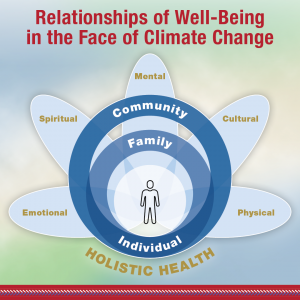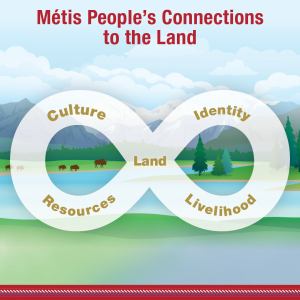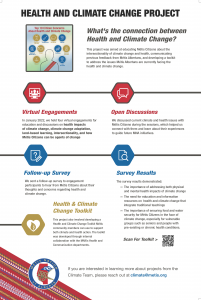 The Health and Climate initiative is aimed at educating Métis Citizens on issues where climate change and health intersect.
The Health and Climate initiative is aimed at educating Métis Citizens on issues where climate change and health intersect.
The purpose of these tools is to raise awareness of the risks facing Métis Albertans and offer resources to navigate climate change impacts.
This project began with a review of previous MNA engagement data from late 2018-early 2019 about health and climate change impacts. From that data and research, we noticed themes emerge on health and climate change through an Indigenous lens.
We then developed and finetuned a health and climate toolkit for Métis community members, based on feedback from recent community engagement sessions, to support both climate change and health action.
This toolkit is made of eight tools separated into three themes:
- The importance of relationships in Métis culture
- Climate change impacts for Métis people
- Actions to support Métis health influenced by climate change
The importance of relationships in Métis culture
These three tools illustrate the importance of relationships in Métis culture. We as humans are also interconnected in our relationships with other living organisms, the natural environment, and the land. The complexity of our relationships means there are many ways climate change can directly or indirectly impact our health.
Our health and well-being affect us as individuals, but also as members of our family and community. This tool shows a web of relationships, and the ways Métis people experience health impacts holistically: spiritually, physically, mentally, culturally, and emotionally.
Our holistic health is interconnected to and influences our family’s and community’s overall wellness. Knowing this helps us support one another in the face of climate change. This tool is tailored from data specific to Métis culture.
The infinity symbol represents Métis culture and our infinite connection to the land. As seen in this tool and in our research, the land is not just the place we live on; it gives us our identity, livelihood, resources, and culture as Métis people.
It is important for us to think about our relationship to the land as reciprocal. The health of the land around us affects our own health. The impacts of climate change, such as natural disasters, pollution, and changes in animal and plant populations, strongly affect the land.
Protecting the land from climate change is a way to protect who we are as Métis.
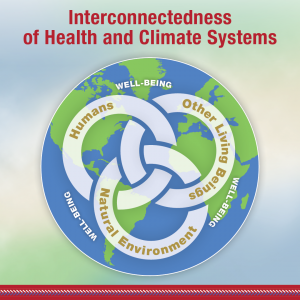
The earth shows how humans, living organisms, and the natural environment’s well-being are all interconnected. A change in one affects the others.
This tool is an example of the importance of interconnectedness in Métis culture. Our health as humans is affected by other living organisms and the natural environment, just as climate is affected by the natural environment, other living organisms, and humans.
Climate change impacts for Métis people
This series goes through different ways climate change affects important elements of Métis people’s lives, including our health. We can draw strength from our resilient Métis culture to mitigate climate change risks.
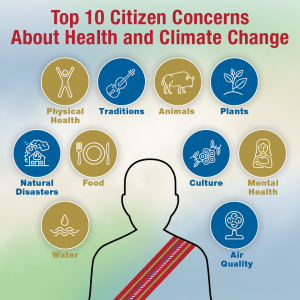
This tool shows the top 10 concerns about health and climate change we heard from Citizens at climate change engagements in late 2018 and early 2019. This information helps us understand your concerns and the areas you focus on in your life and in those in your community.
Traditions and culture, which are important to Métis Albertans, can be tools to support your physical and mental health and the health of fellow community members in the face of climate change.
As seen in this tool, it is also key to consider the health of the environment around you.
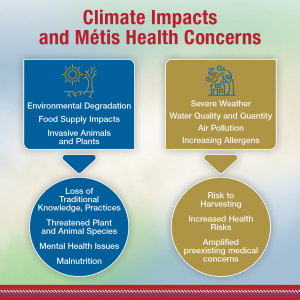
This tool highlights the connection between climate change impacts and the effect on Métis health and well-being.
- Natural disasters can decrease animal and plant populations, reducing food sources and the number of traditional plants where you harvest and gather.
- Water contaminants caused by climate change are a health risk for Métis who harvest in the contaminated area.
- Warmer temperatures from climate change can further spread invasive plants and animals, bringing in disease and threatening existing plants and animals used for food or traditional practices.
- Severe weather events, such as wildfire smoke, can threaten Métis people’s physical health and worsen preexisting medical conditions.
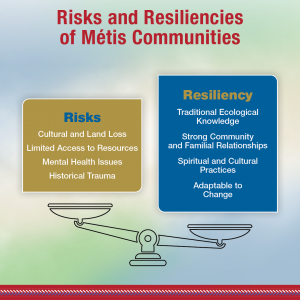
This tool, based heavily on Métis-specific data, shows our Métis community’s risks and resiliencies when dealing with health and climate change issues. Climate change brings risks, not only for the natural environment, but also has a deep impact on marginalized groups.
By understanding these risks and resiliencies, each of us can reflect on the risks we face and find strength in ourselves and our Métis community.
Actions to support Métis health influenced
by climate change
This section of the toolkit provides culturally-relevant actions to support Métis people’s physical and mental health when climate change is involved, such as eco-anxiety. It is important to be aware of physical health risks and find solutions that work for you and your abilities.
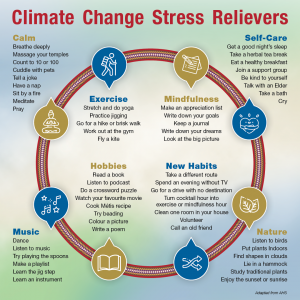
When you act on climate change, you may feel overwhelmed and start to experience what’s called eco-anxiety. This tool shows you different ways to relieve your stress and cope with the mental health effects of climate change. Wellness comes in many forms and everyone’s journey looks a little different.
These culturally-relevant techniques were developed by the Métis Nation of Alberta’s Health department.
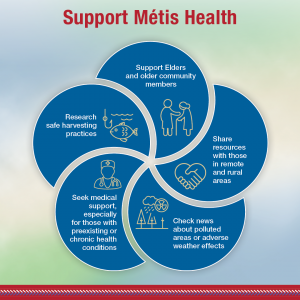
This tool offers supportive information for Métis health risk factors gathered from earlier Citizen engagements.
According to our summary, here is how to take action against these Métis health risk factors, starting clockwise from the top left:
- Dependence on harvesting – Climate change affects the plants and animals Métis people harvest for food. To cope with this, you can research, take relevant courses, and speak with Métis knowledge holders on sustainable harvesting practices.
- Age – People of older age may have chronic disease and low immunity. It is important to recognize and support the needs of our Elders and older individuals.
- Location of residence (urban/rural) – Residence location affects access to resources and supports. You can raise awareness about community members living in remote areas and form a support network or provide resources.
- Use of a particular area – This is a risk factor for those who use areas likely to be severely impacted by climate change (e.g., contaminated water sources, wildfire-prone forested areas). It is important to raise concerns about these specific areas and warn others through signage or education about the health risks when using polluted areas. You can also check the news to learn more about polluted areas.
- Access to medical support – People with preexisting or chronic health conditions are more at risk to have their health affected by climate change. Searching for medical support or preparing for these effects can lessen your risk.
Toolkit Sources
Relationships of Well-Being in the Face of Climate Change
| Source | Author/Organization | |
| 1. | Ontario Health and Climate Change Toolkit | Government of Ontario |
| 2. | Climate Change and Social Inequality (Book) | By Merrill Singer, Published by Routledge |
| 3. | Adapting to the Effects of Climate Change on Inuit Health | American Journal of Public Health (AJPH) |
| 4. | Métis Nation Climate Change & Health Vulnerability Assessment | Métis National Council/JF Consulting |
| 5. | The “value” of values-driven data in identifying Indigenous health and climate change priorities | Climatic Change |
| 6. | Climate Change and Health – Impacts on Remote Indigenous Communities in Northern Australia | The Commonwealth Scientific and Industrial Research Organisation (CSIRO) Marine and Atmospheric Research |
Métis People’s Connections to the Land
| Source | Author/Organization | |
| 1. | Adapting to the Effects of Climate Change on Inuit Health | American Journal of Public Health (AJPH) |
| 2. | Métis Nation Climate Change & Health Vulnerability Assessment | Métis National Council/JF Consulting |
| 3. | Climate Change and Indigenous Health Promotion | International Union for Health Promotion and Education (IUHPE) – Global Health Promotion |
| 4. | “It’s so different today”: Climate change and indigenous lifeways in British Columbia, Canada | Global Environmental Change |
| 5. | The “value” of values-driven data in identifying Indigenous health and climate change priorities | Climatic Change |
| 6. | Climate Change, Health, and Vulnerability in Canadian Northern Aboriginal Communities | Environmental Health Perspectives |
| 7. | Indigenous Health and Climate Change | American Journal of Public Health (AJPH) |
Interconnectedness of Health and Climate Systems
| Source | Author/Organization | |
| 1. | Adapting to the Effects of Climate Change on Inuit Health | American Journal of Public Health (AJPH) |
| 2. | Métis Nation Climate Change & Health Vulnerability Assessment | Métis National Council/JF Consulting |
| 3. | Climate change and Indigenous Health Promotion | International Union for Health Promotion and Education (IUHPE) – Global Health Promotion |
| 4. | “It’s so different today”: Climate change and indigenous lifeways in British Columbia, Canada | Global Environmental Change |
| 5. | The “value” of values-driven data in identifying Indigenous health and climate change priorities | Climatic Change |
| 6. | Book Review: Bioethical Insights into Values and Policy: Climate Change and Health | South African Journal of Bioethics and Law |
Top 10 Citizen Concerns About Health and Climate Change
Source
1. Métis Nation of Alberta (MNA) internal engagement data. Organized themes of data were based on the research from the Centers for Disease Control and Prevention. These eight themes are: food supply impacts; water quality impacts; environmental degradation; changes in vector ecology; severe weather; air pollution; extreme heat; and increasing allergens. Jim Frehs Consulting presented on this material to the Métis governing bodies in early 2020.
See Community-Based Climate Monitoring Initiative Engagement Phase 2018-2019 Highlights for a summary of the data.
Climate Impacts and Métis Health Concerns
Source
1. Métis Nation of Alberta (MNA) internal engagement data. See Community-Based Climate Monitoring Initiative Engagement Phase 2018-2019 Highlights for a summary of the data.
Risks and Resiliencies of Métis Communities
| Source | Organization | |
| 1. | Ontario Health and Climate Change Toolkit | Government of Ontario |
| 2. | Climate Change and Social Inequality | By Merrill Singer, Published by Routledge |
| 3. | Climate change and Indigenous Health Promotion | International Union for Health Promotion and Education (IUHPE) – Global Health Promotion |
| 4. | “It’s so different today”: Climate Change and indigenous lifeways in British Columbia | Global Environmental Change |
| 5. | Climate Change and Health – Impacts on Remote Indigenous Communities in Northern Australia | CSIRO Marine and Atmospheric Research |
| 6. | The Holistic Effects of Climate Change on the Culture, Well-Being and Health of the Saami, the Only Indigenous People in the European Union | Current Environmental Health Reports |
| 7. | Climate Change, Health, and Vulnerability in Canadian Northern Aboriginal Communities | Environmental Health Perspectives |
Support Métis Health
Source
1. Métis Nation of Alberta (MNA) internal engagement data. See Community-Based Climate Monitoring Initiative Engagement Phase 2018-2019 Highlights for a summary of the data.
General
| Source | Author/Organization | |
| 1. | The Medicine Wheel: A Holistic Approach to Neurodecolonization, Mindfulness, and Community Health | Dr. Michael Yellow Bird |
| 2. | Native American (Anishinaabe) Traditional Foods Pyramid | DEFEAT DIABETES, Anishnaabe Center |
| 3. | A framework for reconceptualizing early childhood policies and programs to strengthen lifelong health. | Center on the Developing Child, Harvard University |
| 4. | Métis Urban Housing Corporation/Métis Capital Housing Corporation Healing Framework – Adapted by Treanne StormHunter (2021) | Circle of Courage developed by Larry Brendtro, Martin Brokenleg, and Steve Van Bockern (1990) |
| 5. | Educational Tools on Infectious Disease and Climate Change (Webinar) | Climate Atlas of Canada |
| 6. | Liberating our minds and moving our bodies: Neurodecolonization and Indigenous pathways to healing traumas of colonialism, University of British Columbia | Dr. Michael Yellow Bird |
| 7. | Ontario Climate Change and Health Toolkit & Climate Change and Social Inequality | Government of Ontario |
| 8. | Adapting to Climate Change: A Risk-based Guide for Local Governments | Robert A. Black, James P. Bruce, and I.D. Mark Egener |
| 9. | Advancing generative health services for First Nations, Inuit and Métis peoples | Public lecture by Janet Smylie |
| 10. | Gender-based Analysis Plus (GBA+) Intersectional Framework | Government of Canada |
| 11. | Adapting to the Effects of Climate Change on Inuit Health | James D. Ford, PhD, Ashlee Cunsolo Willox, PhD, Susan Chatwood, MSc, Christopher Furgal, PhD, Sherilee Harper, PhD, Ian Mauro, PhD, and Tristan Pearce, PhD |
| 12. | Métis Nation Climate Change & Health Vulnerability Assessment | Métis National Council/JF Consulting |
| 13. | Climate Change and Social Inequality (Book) | By Merrill Singer, Published by Routledge |
